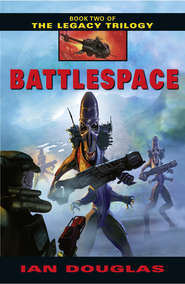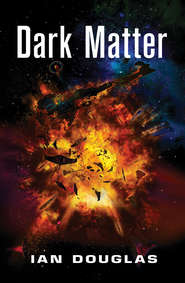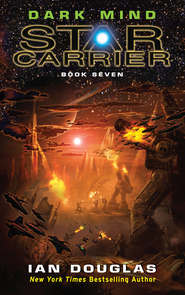По всем вопросам обращайтесь на: info@litportal.ru
(©) 2003-2025.
✖
Star Marines
Настройки чтения
Размер шрифта
Высота строк
Поля
“This way, General, if you please.”
Garroway followed the young Navy lieutenant commander down a corridor with rounded, padded walls and four sets of handrails placed to either side, and above and below. The surface gravity of Phobos was minute; he weighed only a few ounces here, and he could make his way with considerable speed by pulling himself along hand-over-hand. The tunnel was crowded with military personnel of all services, and a number of civilians as well, all moving in the same direction.
“Just where in hell are we going, commander?” Garroway demanded.
“Orders, sir,” she replied. “From Earth! We’re evacuating Phobos.”
“So I gather. Why?”
“Damfino … uh, sorry, sir. I don’t know. But hurry! Please!”
Like red cells crowding through a blood vessel, the crowd followed a bend in the passageway leading left, then took a new tunnel that opened in the overhead of the old. Hauling himself up against the moonlet’s feeble gravity, he soon entered a massive airlock, and recognized one of the main docking connectors giving access to the labyrinth of tunnels and rooms honeycombing Phobos. Two scared-looking naval personnel clung to the bulkheads, waving people on, and up.
Moments later, Garroway followed his escort into the main lock of the armed transport Commodore Edward Preble.
His escort threaded her way ahead through the press of bodies, leading him at last to a compartment marked COMMUNICATIONS CENTER.
“They wanted you in here, sir,” she told him. “Go to Channel Fifteen, and identify yourself. Good luck!”
“Thank you, Commander …”
But she was already gone.
Preble’s comm center was a circular room with several oversized, sharply reclined chairs set around the room’s perimeter, half of them already occupied by naval officers. Garroway picked an empty seat, lay down, and brought the palm of his hand into contact with the electronic pickup in the armrest.
“Channel Fifteen,” he said in his mind. “Garroway, Clinton. Major General. Service number seven-seven-six, three-one—”
A window opened in his mind.
He recognized the face looking out at him—an old friend, Major General Ronald Edison, CO of the Marine Interstellar Expeditionary Command, and Garroway’s boss. “Good morning, Clint,” Edison said. The older man’s eyes flicked to a point offcamera, then back. “At least, it’s morning here. We have … a problem.”
Garroway didn’t respond. Edison was on Earth—probably in his office in the Pentagon, in Arlington, Virginia—and with the current respective positions of Earth and Mars, a lasercom signal took over fourteen minutes to pass one-way from one to the other. Edison had transmitted this message almost a quarter of an hour earlier.
“Thirty minutes ago, we received an emergency tight-beam radio communication from the Titan-class monitor Prometheus. The message was transmitted from near Saturn at zero-four-forty-eight hours Zulu—that’s just over an hour and a half ago. Here is the message in its entirety.”
The general’s face vanished, replaced by a sight Garroway knew, but had hoped never to see in his lifetime—a rapidly growing oval of pure gold, reflecting the light of a distant sun as it approached the camera. The image shifted to a different angle, this one taken from a remote drone some distance away and off to one side. The golden oval was only the end-on view of an immense vessel, shaped like a flattened needle, slim, but titanic in bulk and mass. Flickering alphanumerics on the border of the noumenal image, together with computer-generated schematics, suggested a vessel nearly two kilometers long, hundreds of meters thick, and massing somewhere in the tens of millions of tons.
“The ship appears to be identical to the one we encountered at Sirius in 2170!” a new voice was saying. Static hissed and blasted, distorting the words. The intruder must be putting out some sort of high-energy field, interfering with the transmission. “We have just lost contact with the High Guard patrol frigate Rasmusson, which … well, their last known position would have been pretty close to this monster’s line of approach.
“It’s coming from just about right ascension six hours, forty-five minutes, declination minus sixteen degrees, forty-three minutes … in Canis Major. Pretty much bang-on the position of Sirius. I think this thing popped through the Stargate out there, and came straight to us. It’s getting closer …”
Fresh static washed across the message, and the image shivered and flickered. Garroway strained to hear the next few words. “… ters of … Dawn … huge … no communications …” Image and sound garbled out for a few seconds, then, eerily, came back, momentarily clear. “Get the word out!” the speaker said. “They’re back!”
Then the image flared white with interference snow, turned ragged, and was gone.
General Edison’s face stared again into Garroway’s noumenal gaze. “The Hunter ship approached the Prometheus at point nine-five c before slowing to a relative stop in seconds. We can assume that after destroying the monitor, it has continued into the inner system at near-light speed. It may reach Earth at any moment.
“The President has alerted all commands to the threat. As of this moment, we are on a full war alert. I’ve ordered the evacuation of Phobos, on the assumption that the invaders will be able to detect the communications nexus there, and may strike there as well. In ships, you might have a chance.
“This is what we’ve been dreading for a century and a half, Clint. It’s finally happened. They’ve found us. Somehow, God knows how, we’ve got to stop them.
“I am hereby authorizing full implementation of the RST, and transferring command to 1MIEU. If you can stop that monster, Clint … do it! We’re counting on you. All of us.”
And the image blinked out, replaced by the words TRANSMISSION ENDS, and the globe-and-anchor logo of the U.S. Marine Corps.
Garroway opened his eyes, staring up at the green-painted overhead. Stop that monster? Gods … how? That thing was a mile long, tossed black holes as missiles, and—if the data recovered at Sirius was correct—capable of blowing up a sun.
They’d be damned lucky if any of them simply survived the next couple of hours.
We Who Are
Asteroid Belt
0658 hrs, GMT
The huntership didn’t need to proceed all the way in-system to the primary target within 2420-544, a typical rocky, life-infested world three-quarters covered by water, and enveloped in an atmosphere consisting of nitrogen, oxygen, and various trace gases. We Who Are were never hasty, and never took unnecessary risks. Judging from the explosion of increased radio traffic now beginning to ripple out from the principle technological centers of this civilization, the dominant species here was aware of the Hunters’ presence, and were in the process of responding. From the Huntership’s vantage point, they’d just thrust a stick into a hive of swarming, stinging fliers. Until this Species 2824’s technology—in particular their military capability—could be fully assessed, caution was warranted.
But closing with the infested planet was not necessary. Most solar systems contained the leftover debris of their formation, and this one was no exception. Between the orbits of the fourth and fifth planets, especially, a number of asteroids, ranging from gravel to objects the size of mountains to fair-sized worldlets hundreds of standard units across, drifted in their individual orbits about the local star. It would only be necessary to capture a few of these and sling them into new orbits, targeting the infested worlds. How the primitives dealt with the situation would tell We Who Are much about their technical and military capabilities.
Intelligent civilizations, the group mind of We Who Are had concluded, were pernicious, like life itself popping up everywhere and anywhere, given the least bit of provocation. The majority, actually, were atechnic and harmless; some were actively useful in the greater scheme of things, candidates for patterning and inclusion within the college of minds comprising We Who Are. These, the far-ranging cultivators of We Who Are watched, tended, and occasionally weeded with clarity and dispassion.
A few, however, developed material technology early in their careers. As had the original progenitors of We Who Are a billion years in the remote past, these swiftly mastered primitive chemical energy-producing systems, nuclear power and nanotechnology, and finally the ultimate mysteries of quantum energy and the zero-point field. For such civilizations, anything was possible, including, inevitably, a direct challenge to the existence of We Who Are.
A billion years in the past, the Progenitors had survived a hostile and highly competitive world through the simple expedient of eliminating all possible rivals. It was a lesson in Darwinian realities that became virtually hard-wired into the species, a basic assumption of how the universe worked that, even when they began redesigning their own existence, they did not examine or question.
Any species, any civilization, any organism, any idea that posed a threat to the survival of We Who Are would be eliminated, immediately and by the most efficient and expeditious manner possible.
With some situations, it was necessary to induce the local star to go nova. That was definitely a last-resort option, however. Habitable planets were rare enough, and useful enough, that it was wasteful to reduce one to a seared and airless cinder. That option was reserved for alien civilizations that had advanced too far for a simple bombardment to be effective.
For most nascent technic civilizations, however, a few high-velocity asteroids slammed into the crust eliminated the pests without rendering the world permanently uninhabitable. Members of the species that survived the actual impacts—even those individuals belonging to space-faring cultures stranded on other worlds, tended to eliminate themselves in short order as they fought over dwindling resources, or died as their technological infrastructures—always so precariously in the balance!—failed.
That approach would certainly be adequate in the case of the infestation in the planetary system of 2420-544. We Who Are adjusted the vector of the huntership, closing with a likely asteroid. …
Assault Detachment Alpha
Eos Chasma,
Mars
1523 hrs, local
“Here they come!”
Garroway looked up into the deep ultramarine of the Martian sky. A trio of bright stars shone almost directly overhead, slowly growing brighter.
Two hundred meters away, the Special Forces troopers had already set out landing beacons, which pulsed brightly at both optical and infrared wavelengths. They would guide the shuttles down to the LZ.
“Assault Detachment Alpha, this is Navy Sierra One-one,” a voice said over Garroway’s headphones. “You boys are cleared for first dust-off. Stand ready.”











